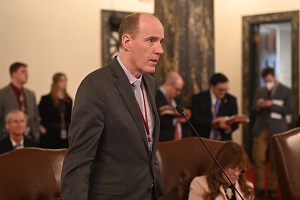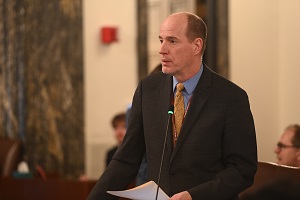- Details
- Category: Press Releases
 SPRINGFIELD – State Senator Bill Cunningham championed legislation to establish ethical guidelines to address ongoing concerns in the red light camera industry.
SPRINGFIELD – State Senator Bill Cunningham championed legislation to establish ethical guidelines to address ongoing concerns in the red light camera industry.
“We have seen numerous bad actors throughout local and state government,” said Cunningham, a Democrat who represents portions of Chicago and the Southwest Suburbs. “This legislation will put roadblocks in place to ensure that bad actors are punished for their crimes.”
The measure prohibits campaign contributions from contractors who provide the automated traffic enforcement equipment, also known as red light cameras, to any political action committee created by a contractor and any affiliates. Campaign contributions from such sources have been a cause for controversy in past years.
Further, beginning six months before an automated traffic law enforcement system is installed at an intersection, a county or municipality may not change the yellow light interval at that intersection.
Additionally, IDOT can revoke any permit for red light cameras if any official or employee who serves that county or municipality is charged with bribery, official misconduct, or a similar crime related to the placement, installation, or operation of the automated traffic law enforcement system in the county or municipality.
State Representative Mary Gill (D-Chicago), who was appointed back in March to fill the vacancy created by the retirement of State Representative Fran Hurley, plans to support the measure as it returns to the House for a vote.
“We want people to be able to know that the government is not being influenced by private companies,” Gill said. “This legislation is a victory for good government advocates and residents impacted by past industry corruption.”
House Bill 3903 passed the Senate with bipartisan support.
- Details
- Category: Press Releases
 SPRINGFIELD – State Senator Bill Cunningham advanced legislation that ensures Chicago police officers, firefighters and paramedics who contracted COVID-19 while on the job will receive the disability benefits they earned.
SPRINGFIELD – State Senator Bill Cunningham advanced legislation that ensures Chicago police officers, firefighters and paramedics who contracted COVID-19 while on the job will receive the disability benefits they earned.
“Chicago first responders are entitled to the exact same health and safety protections that were provided to other essential workers during the pandemic,” said Cunningham, a Democrat who represents portions of Chicago and the Southwest Suburbs. "If the Chicago police and fire pension funds are going to claim a legal technicality to refuse to protect our first responders, then the state legislature will have to step in to put protections in place. That is exactly what House Bill 3162 does — it requires the Chicago pension funds to grant the same COVID-19 presumption that all other workers receive.”
As a result of this presumption, affected police officers and firefighters would be entitled to 75% of their salary at the time of disability and duty disability benefits, instead of the current 50% under ordinary disability benefits. The legislation applies retroactively, providing relief to those who were denied full duty disability benefits after contracting COVID-19 while on the job.
Illinois Comptroller Susana Mendoza has been leading the fight for passage of House Bill 3162. Her brother was denied full duty disability benefits after contracting COVID-19 while working 17 straight days before a vaccine was available in November 2020. Police Sergeant Joaquin Mendoza spent 72 days in the hospital, suffered kidney failure, had five strokes, and lost the use of his left arm. If he had been granted full duty disability, he would have received 75% of his salary and health insurance. His claim was denied and he was instead granted 50% of his salary for no more than four years, regardless of injury, and had his health insurance canceled.
“There are a few dozen officers and firefighters like Sgt. Mendoza who contracted COVID-19 on the job and have been unable to return to work because of the extent of their injuries,” Cunningham said. “House Bill 3162 will ensure they will be able to pay their bills, support their families, and keep their health insurance.”
House Bill 3162 passed the Senate on Friday and heads to the governor’s desk for final approval.
- Details
- Category: Press Releases
 SPRINGFIELD – State Senator Bill Cunningham passed a bill through the Senate on Friday, which aims to provide mental health support and education for law enforcement officers who are facing post-traumatic stress disorder.
SPRINGFIELD – State Senator Bill Cunningham passed a bill through the Senate on Friday, which aims to provide mental health support and education for law enforcement officers who are facing post-traumatic stress disorder.
“We are not passing any new mandate on law enforcement,” said Cunningham, a Democrat who represents portions of Chicago and the Southwest Suburbs. “We are creating a supportive resource that officers can utilize for specific traumatic situations and for PTSD."
The Statewide PTSD Mental Health Coordinator will be appointed by the governor, with the advice and consent of the Senate, and shall serve for a term of four years. The coordinator will be responsible for providing resources, information and assistance to law enforcement officers who may be experiencing PTSD symptoms or other mental health issues related to their work.
47% of law enforcement officers screen positive for PTSD using the Primary Care Screen, which is ten times greater than the general population. The bill is not intended to mandate that local police departments implement a plan to address PTSD or a set of requirements for how to operate mental health and wellness plans within their department, but rather to provide a supportive resource that departments and individual officers can turn to when seeking help.
"We can’t just talk about mental health – we have to put our money where our mouth is and give law enforcement access to more resources,” said Cunningham.
Senate Bill 1543 passed the Senate and awaits further action in the House.
- Details
- Category: Press Releases
 SPRINGFIELD – State Senator Bill Cunningham is leading legislation that requires sports wagering apps to display a pop-up message directing individuals to a website with resources for gambling addiction assistance after every 10 wagers made.
SPRINGFIELD – State Senator Bill Cunningham is leading legislation that requires sports wagering apps to display a pop-up message directing individuals to a website with resources for gambling addiction assistance after every 10 wagers made.
"Illinois has been a leader in the regulation of sports betting, and we need to ensure that we are also addressing the potential harms associated with gambling addiction," said Cunningham, a Democrat who represents portions of Chicago and the Southwest Suburbs. "By requiring sports wagering apps to display a pop-up message with resources for gambling addiction assistance, we can help individuals who may be struggling with problem gambling access the help they need."
The Sports Wagering Act and Illinois Administrative Code currently require a sportsbook to display a statement on its portal, internet website, or computer or mobile application regarding obtaining assistance with gambling problems. However, Senate Bill 1508 goes a step further to ensure that individuals who may be struggling with problem gambling have additional access to resources and support.
The pop-up message would direct individuals to a website with information about the voluntary self-exclusion program established by the Illinois Gaming Board and the Department of Lottery. The program enables individuals to prohibit themselves from establishing a sports wagering account.
"Problem gambling can have a devastating impact on individuals and their families, and we need to do everything we can to prevent and address it," said Cunningham. "Illinois will continue to be a leader in the modern sports gambling industry and we need to make sure that those who need help won’t have to ask how to find it.”
Senate Bill 1508 passed the Senate Health and Human Services Committee and now awaits a vote before the full Senate.
More Articles …
Page 12 of 72



